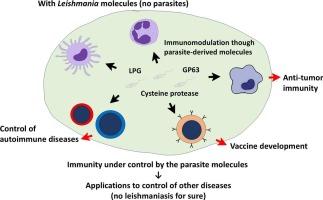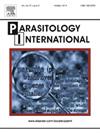利什曼寄生虫的免疫调节作用:控制其他疾病的潜力
IF 1.5
4区 医学
Q3 PARASITOLOGY
引用次数: 0
摘要
在哺乳动物宿主体内,利什曼原虫在巨噬细胞的吞噬泡内生存和增殖。为了避免被免疫细胞杀死,利什曼寄生虫利用其分子操纵巨噬细胞的功能以求生存。这类免疫调节分子的目标并不局限于巨噬细胞,利什曼原虫衍生的分子有时也会对中性粒细胞、树突状细胞、T 细胞和 B 细胞等其他免疫细胞产生影响。本综述涵盖利什曼寄生虫对宿主免疫的免疫调节研究,并介绍参与免疫调节的寄生虫衍生分子的一些实例。例如,利什曼原虫细胞表面脂磷聚糖(LPG)可调节巨噬细胞中的 TLR2 信号和 PI3K/Akt 轴,从而诱导 Th2 细胞。由于炎性细胞因子的长期分泌是动脉粥样硬化、克罗恩病和类风湿性关节炎等免疫介导疾病的原因之一,因此 LPG 可作为抑制炎症的药物。利什曼病分子的独特特性有望成为控制利什曼病以外其他疾病的免疫调节药物来源。本文章由计算机程序翻译,如有差异,请以英文原文为准。

Immunomodulation by Leishmania parasites: Potential for controlling other diseases
In the mammalian hosts, Leishmania parasites survive and proliferate within phagolysosomes of macrophages. To avoid being killed by the immune cells, Leishmania parasites utilize their molecules to manipulate macrophages' functions for survival. Targets of such immunomodulatory molecules are not limited to macrophages, as Leishmania-derived molecules sometimes show influence on other immune cells such as neutrophils, dendritic cells, T cells and B cells. This review covers research on immunomodulation of host immunity by Leishmania parasites and introduces some examples of parasite-derived molecules participating in the immunomodulation. For example, Leishmania cell surface lipophosphoglycan (LPG) can modulate TLR2 signaling and PI3K/Akt axis in macrophages leading to induction of Th2 cells. Because chronic secretion of inflammatory cytokines is one of the causes of immune-mediated diseases such as atherosclerosis, Crohn's disease, and rheumatoid arthritis, LPG may be useful as a drug to suppress the inflammatory conditions. The unique characteristics of leishmanial molecules pose a promise as a source of immunomodulatory drugs for controlling diseases other than leishmaniasis.
求助全文
通过发布文献求助,成功后即可免费获取论文全文。
去求助
来源期刊

Parasitology International
医学-寄生虫学
CiteScore
4.00
自引率
10.50%
发文量
140
审稿时长
61 days
期刊介绍:
Parasitology International provides a medium for rapid, carefully reviewed publications in the field of human and animal parasitology. Original papers, rapid communications, and original case reports from all geographical areas and covering all parasitological disciplines, including structure, immunology, cell biology, biochemistry, molecular biology, and systematics, may be submitted. Reviews on recent developments are invited regularly, but suggestions in this respect are welcome. Letters to the Editor commenting on any aspect of the Journal are also welcome.
 求助内容:
求助内容: 应助结果提醒方式:
应助结果提醒方式:


